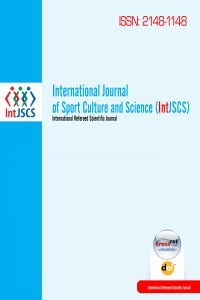Effect of Repeated Carbohydrate Mouth Rinsing on Female’s Sprint Power Output
Cycling performance, mouthwash, ergogenic aids, wingate,
___
- Ali A, Moss C, Yoo MJY, Wilkinson A, Breier B (2017). Effect of Mouth Rinse and Ingestion of Carbohydrate Solutions on Mood and Perceptual Responses Durin Exercise. 14:
- Aras D, Arslan E, Atlı A, Şahin FN (2016). Menstrual Döngünün Fazlarına Göre Sedanter Kadınlarda Anaerobik Güç Değerlerinin İncelenmesi, Spormetre., 14:191-198.
- Beelen M, Beghuis J, Bonaparte B, Ballak SB, Jeukendrup AE, Van Loon LJC (2009). Carbohydrate mouth rinsing in the fed state: lack of enhancement of time-trial performance, International Journal of Sport Nutrition and Exercise Metabolism, 19:400–409.
- Bortolotti H, Pereira LA, Oliveira RS, Cyrino ES, Altimari LR (2013). Carbohydrate mouth rinse does not improve repeated sprint performance. Brazilian Journal of Kinanthropometry, 15:639-645.
- Burke LM, M RJ (2015). The Governor has a sweet tooth- Mouth sensing of nutrients to enhance sports performance, European Journal of Sport Science., 15:29-40.
- Chambers ES, Bridge MW, Jones DA (2009). Carbohydrate sensing in the human mouth: effects on exercise performance and brain activity. Journal of Physiology, 587:1779-1794.
- Chong E, Guelfi KJ, Fournier PA (2011). Effect of a Carbohydrate mouth rinse on maximal sprint performance in competitive male cyclist, Journal of Sport Science and Medicine in Sport, 14:162-167.
- Chong E, Guelfi KJ, Fournier PA (2014). Combined Glucose Ingestion and Mouth Rinsing Improves Sprint Cycling Performance. International Journal of Sport Nutrition and Exercise Metabolism, 24:605-612.
- Coyle EF, Coggan AR, Hemmert MK,et al. (1986). Muscle glycogen utilization during prolonged strenuous exercise when fed carbohydrate, J Appl Physiol., 61:165–72.
- Dorling JL, Ernest CP (2013). Effect of carbohydrate mouth rinsing on multiple sprint performance. Journal of the International Society of Sports Nutrition, 10:41-49.
- Gant N, Stinear CM, Byblow WD (2010). Carbohydrate in the mouth immediately facilitates motor output, Brain Research, 1350:151–158.
- Hopkins WG, Schabort EJ, Hawley JA (2001). Reliability of power in physical performance tests, Sports Medicine, 31:211-234.
- Inbar O, Bar-Or O, Skinner JS. (1996). The wingate anaerobic test, Champaign:Human Kinetics. Pp 1-95.
- James RM, Sarah R, Rollo I, James LJ. (2017). No Dose Response Effect of Carbohydrate Mouth Rinse on Cycling Time-Trial Performance. International Journal of Sport Nutrition and Exercise Metabolism, 26:25-31.
- Jensen M, Stellingwerff T, Klimstra M. (2015). Carbohdyrate Mouth Rinse Couters Fatigue Related Strength Reduction, International Journal of Sport Nutrition and Exercise Metabolism, 25:252-261.
- Jeukendrup AE, Moseley L, Mainwaring G. I., Samuels S, Perry S, & Mann CH (2006). Exogenous carbohydrate oxidation during ultraendurance exercise, Journal of Applied Physiology, 100:1134-1141.
- Jeukendrup AE, Rollo I, Carter JM. (2013). Carbohydrate Mouth Rinse: Performance Effects and Mechanisms. Sports Science Exchange, 26:1-8.
- Kulaksız TN, Koşar ŞN, Bulut S, Güzel Y, Willems MET, Hazir T, Turnagöl HH (2016). Mouth Rinsing with Maltodextrin Solutions Fails to Improve Time Trial Endurance Cycling Performance in Recreational Athletes. Nutrients, 8:269-283.
- Philips SM, Findland S, Kavaliauskus M, Grant MC (2014). The Influence of Serial Carbohydrate Mouth Rinsing on Power Output during a Cycle Sprint, Journal of Sports Science and Medicine, 13:252-258.
- Pottier A, Bouckaert J, Gilis, W, Roels, T, Derave W (2010). Mouth rinse but not ingestion of a carbohydrate solution improves 1-h cycle time trial performance, Scandinavian Journal of Medicine & Science in Sports, 20:105–111.
- Özkan A, Köklü Y, Ersöz G (2010). Wingate anaerobik güç testi, Uluslararası İnsan Bilimleri Dergisi, 7:207-224.
- Rollo I, Cole M, Miller R, Williams C (2010). Influence of mouth rinsing a carbohydrate solution on 1-h running performance, Medicine and Science in Sports and Exercise, 42:798– 804.
- Rollo I, Williams C (2011). Effect of Mouth-Rinsing Carbohydrate Solutions on Endurance Performance. Sports Medicine, 41:449-461.
- Sinclair J., et al. (2014). The effect of different durations of carbohydrate mouth rinse on cycling performance. European Journal of Sport Science, 14:259-264.
- Tsintzas OK, Williams C, Boobis L, et al. (1996). Carbohydrate ingestion and single muscle fiber glycogen metabolism during prolonged running in man, J Appl Physiol., 81:801–809.
- Whitham M, McKinney J (2007). Effect of a carbohydrate mouthwash on running time-trial performance. Journal of Sports Sciences, 25:1385–1392.
- ISSN: 2148-1148
- Başlangıç: 2013
- Yayıncı: Uluslararası Bilim Kültür ve Spor Derneği (UBİKS)
Kenioua MOULOUD, Boumesjed Abd ELKADER
Raci KARAYIGIT, Burak Caglar YASLI, Hakan KARABIYIK, Goktug ERTETIK, Mitat KOZ, Gulfem ERSOZ
